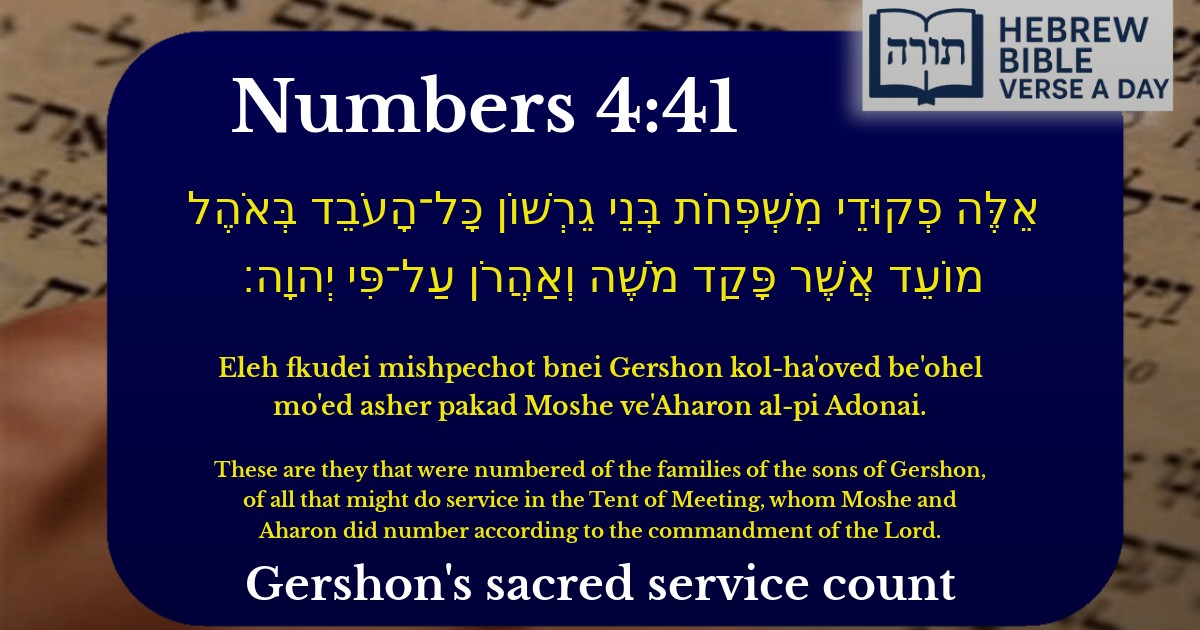Join Our Newsletter To Be Informed When New Videos Are Posted
Join the thousands of fellow Studends who rely on our videos to learn how to read the bible in Hebrew for free!
Hebrew Text
אֵלֶּה פְקוּדֵי מִשְׁפְּחֹת בְּנֵי גֵרְשׁוֹן כָּל־הָעֹבֵד בְּאֹהֶל מוֹעֵד אֲשֶׁר פָּקַד מֹשֶׁה וְאַהֲרֹן עַל־פִּי יְהוָה׃
English Translation
These are they that were numbered of the families of the sons of Gershon, of all that might do service in the Tent of Meeting, whom Moshe and Aharon did number according to the commandment of the Lord.
Transliteration
Eleh fkudei mishpechot bnei Gershon kol-ha'oved be'ohel mo'ed asher pakad Moshe ve'Aharon al-pi Adonai.
Hebrew Leining Text
אֵ֣לֶּה פְקוּדֵ֗י מִשְׁפְּחֹת֙ בְּנֵ֣י גֵרְשׁ֔וֹן כׇּל־הָעֹבֵ֖ד בְּאֹ֣הֶל מוֹעֵ֑ד אֲשֶׁ֨ר פָּקַ֥ד מֹשֶׁ֛ה וְאַהֲרֹ֖ן עַל־פִּ֥י יְהֹוָֽה׃
אֵ֣לֶּה פְקוּדֵ֗י מִשְׁפְּחֹת֙ בְּנֵ֣י גֵרְשׁ֔וֹן כׇּל־הָעֹבֵ֖ד בְּאֹ֣הֶל מוֹעֵ֑ד אֲשֶׁ֨ר פָּקַ֥ד מֹשֶׁ֛ה וְאַהֲרֹ֖ן עַל־פִּ֥י יְהֹוָֽה׃
🎵 Listen to leining
Parasha Commentary
📚 Talmud Citations
This verse is not quoted in the Talmud.


Context and Overview
The verse (Bamidbar 4:42) details the census of the Gershonite families, who were assigned specific duties in the Mishkan (Tabernacle). This follows the broader theme in Sefer Bamidbar of organizing Bnei Yisrael for their roles in the desert and in divine service. The Gershonites, as descendants of Levi, were entrusted with transporting the coverings and curtains of the Mishkan (Bamidbar 4:24-28).
Rashi's Explanation
Rashi (Bamidbar 4:42) emphasizes the phrase "אֲשֶׁר פָּקַד מֹשֶׁה וְאַהֲרֹן" ("whom Moshe and Aharon did number"), noting that the counting was done with precision and divine authority. He explains that Moshe and Aharon acted "עַל־פִּי יְהוָה" ("according to the commandment of the Lord"), meaning this was not an arbitrary census but a direct fulfillment of Hashem's instruction, ensuring the sanctity of the Mishkan service.
Rambam on the Role of the Gershonites
In Hilchos Klei HaMikdash (3:1), Rambam discusses the Levitical duties, including those of the Gershonites. He notes that their responsibility for the Mishkan's coverings and hangings was critical, as these items protected the holiness of the inner sanctums. The meticulous counting ensured that only those fit for service—both in lineage and physical capability—were assigned these sacred tasks.
Midrashic Insights
The Midrash Tanchuma (Bamidbar 6) highlights that the counting of the Gershonites reflects Hashem's love for Klal Yisrael. Just as a king counts his treasured possessions, Hashem commanded Moshe and Aharon to count those who would serve in the Mishkan, showing their value in His eyes. The phrase "כָּל־הָעֹבֵד בְּאֹהֶל מוֹעֵד" ("all that might do service in the Tent of Meeting") underscores that their labor was not merely physical but a form of avodas hakodesh (holy service).
Practical Lessons